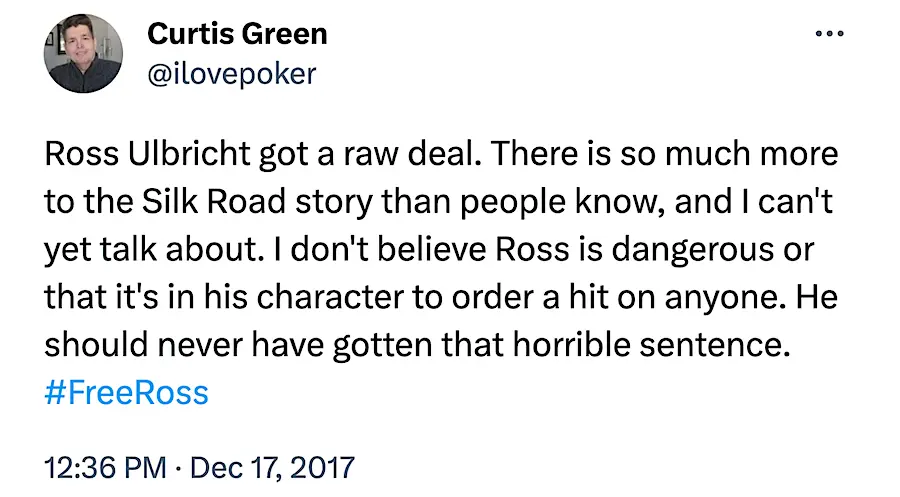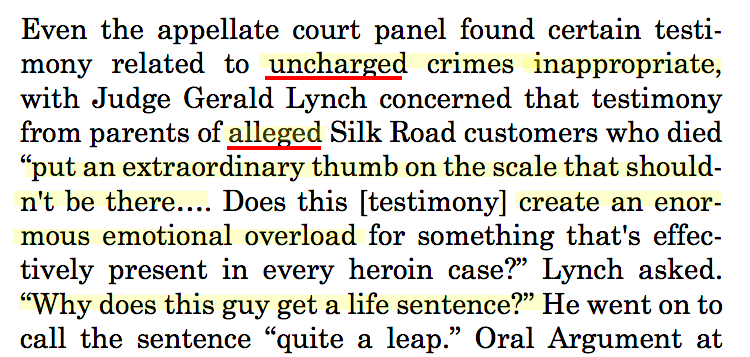Misinformation about the Silk Road Case
Many news articles about Ross Ulbricht and his case present sensationalized, inaccurate or false information.
The purpose of this page is to debunk the most common misconceptions.
- “Ross paid to have people killed”
- “Ross was offered a 10-year plea deal and rejected it”
- “Silk Road allowed the sale of child porn, human organs, hitmen and other violent listings”
- “Some people overdosed from drugs bought on Silk Road and this was presented to Ross’s jury at trial”
- “The book ‘American Kingpin’ is well-researched, accurate and the real story”
- “Ross is a drug kingpin”
- “Ross was the only one running Silk Road the entire time”
- “Ross created Silk Road as a drug market and for financial gain.”
“Ross paid to have people killed”
False. Amplified through inaccurate and sensationalized reporting, these false murder-for-hire allegations were used to deny Ross Ulbricht’s bail, smear him in the media, and justify the life sentence he ultimately received.
Ross was never tried for these allegations, which means the allegations were never ruled on by a jury and Ross was never found guilty of paying to have anyone killed. These unproven and unprosecuted accusations were eventually dismissed “with prejudice” in 2018, and therefore can never be re-filed or used against Ross again.
The allegations were never proven in court and relied on anonymous chats and text files never proven to have been authored by Ross. Hard evidence and testimony—including from the lead Silk Road investigator—show that, over time, multiple people were behind the site admin’s handle (who was called Dread Pirate Roberts or “DPR” for short). Two corrupt federal investigators (sent to prison) also had unfettered access to Silk Road and were admittedly involved in numerous plots.
Ross has always denied being involved with these allegations. And even Curtis Green, the only alleged victim ever identified in these allegations, has spoken out against these allegations and is a longtime, fervent supporter of Ross’s release.

“Ross was offered a 10-year plea deal and rejected it”
False. First, prosecutors made no written offer. Second, the verbal offer prosecutors extended to Ross was that, if he pled guilty to the conspiracy charges he was arrested for, he would face 10 years to life imprisonment. Ross was told by his attorneys that if he pled guilty, the government would argue for a life sentence with his sentencing judge.
Prosecutors told Ross that if he did not accept this offer, they would stack the Continuing Criminal Enterprise statute (aka “kingpin” statute) onto his charges, which would increase Ross’s mandatory minimum to 20 years.
Not informed of the risks of going to trial, and after being advised by his attorneys, Ross instead chose to go to trial.
Despite misstatements by the media, the legal record confirms that Ross was never offered a “10-year plea deal.” If this were true, Ross would have taken it!

“Silk Road allowed the sale of child porn, human organs, hitmen and other violent services”
False. Even the government never alleged this at Ross Ulbricht’s trial and this isn’t part of his charges. Silk Road was a free market based on the libertarian non-aggression principle. The site’s guiding philosophy was that transactions must be voluntary and no third party is harmed. Therefore, such listings were not allowed and taken down by moderators. The Silk Road Seller’s Guide, part of government evidence, clearly banned child pornography, and generally anything used to “harm or defraud” others. The lead government investigator’s testimony at trial also confirmed this.
Lastly, no evidence of any actual sales on Silk Road for such items has ever been presented


See What was Silk Road.
Some people overdosed from drugs bought on Silk Road and this was presented to Ross’s jury at trial”
False. This allegation was never charged at trial or presented to jurors. Ross was not prosecuted for causing harm or bodily injury and no victim was named at trial.
A few months after Ross’s trial ended and the jury had rendered their verdict, prosecutors discussed allegations of overdose during the sentencing hearing and brought in parents of two alleged victims for impact statements. The Court of Appeals found such testimony at sentencing inappropriate.
A detailed forensic pathology report [PDF] concluded that no cause of death could be scientifically determined nor linked to Silk Road.
Many respected organizations have argued against these uncharged allegations, including Law Enforcement Action Partnership, National Lawyers Guild, FreedomWorks, Human Rights Defense Center, and more. Briefs can be read here, here, here.

“The book ‘American Kingpin’ is well-researched, accurate and the real story”
False. It is not the real story by any means. This book is sensationalized and fictionalized and is a one-sided narrative. It was written to be a page turner, so the author took liberties, with little regard for truth and accuracy.
- It contains many inaccurate or flat-out false details about Ross’s personal life, the Silk Road website, and the case.
- Facts and events about Ross’s life, Curtis Green’s life and the case have been distorted or made up.
- It cherry-picks and leaves out important information.
- It relies on unproven, uncharged allegations Ross was never found guilty of. (See “Ross tried to have people killed” and “Some people overdosed from drugs and this was presented to Ross’s jury at trial”)
The author of the book has never taken the time to speak to Ross, and Ross’s family and friends refused to participate in the project as they were informed that, even before Ross’s trial, the author was set on writing a sensationalized, one-sided narrative.
“Ross is a drug kingpin”
False. Ross is a website creator, not a kingpin. He did not store, transport or have contact with any of the legal or illegal items sold on the website. He had no relationship with the sellers and no influence over prices.
In fact, the CCE charge (also known as “kingpin” charge) was only added by prosecutors when Ross chose to go to trial.
Note: Blake Benthall, the co-owner of Silk Road 2.0, a larger replica with more sales per month— arrested in 2014 on the same charges Ross was—was freed after 13 days in jail and faced only tax evasion fines.
See All Non-violent Trial Charges and Convictions and Extreme Sentencing Disparity.
“Ross was the only one running Silk Road the entire time”
False. The prosecution claimed that Ross controlled Silk Road from start to finish and was the only person behind the accounts of the top administrator, “Dread Pirate Roberts” (DPR, a character from The Princess Bride, who passed his name and identity on to his successors). This narrative was also the basis for the now-dismissed, false allegations of murder-for-hire used against Ross. Yet, this is contradicted by hard evidence and testimony and was forbidden, among other key information, from being discussed, or developed, in front of Ross’s jury:
- The lead investigator, who worked undercover on Silk Road for two years, never suspected Ross as being DPR. During his lengthy investigation, he believed someone else was operating the site.
- DPR granted an exclusive interview to Forbes in 2013 and stated that he wasn’t its original creator and that he “inherited” the website from someone else.
- A Silk Road administrator told prosecutors that DPR failed an identity authentication “handshake,” indicating multiple people shared the DPR accounts.
- DPR logged into the Silk Road forum several weeks after Ross’s arrest, when Ross was in solitary confinement. (Discovered after Ross’s trial.)
“Ross created Silk Road as a drug market and for financial gain.”
False. When he launched Silk Road, Ross Ulbricht was an idealistic libertarian in his twenties who wanted to provide the experience of a truly free market. In college, he had worked on the Ron Paul campaign, studied Austrian economics and was driven by ideals of liberty, personal freedom, and privacy. Silk Road was created as a libertarian free market and was based on the libertarian non-aggression philosophy.
Although most people did buy and sell illegal drugs on Silk Road, there were also legal categories on the website. Like on eBay, it was up to individuals what was listed (as long as it didn’t break the site’s rules).
As attested to in over hundreds of letters to Ross’s judge and to the President by those who know him, Ross had always been an idealist and he led a modest, frugal life with few possessions. At the time of his arrest, he was sharing an apartment with three roommates and didn’t own a car.
“Silk Road turned out to be a very naive and costly idea that I deeply regret…It was supposed to be about giving people the freedom to make their own choices, to pursue their own happiness however they individually saw fit…I do not, and never have, advocated the abuse of drugs…I understand what a terrible mistake I made.”
– Ross in letter to the Court
To read Ross’s own words, see Ross’s letter to the Court [PDF] and his letter to the president [PDF]
Also see Who is Ross Ulbricht? and What Was Silk Road?
